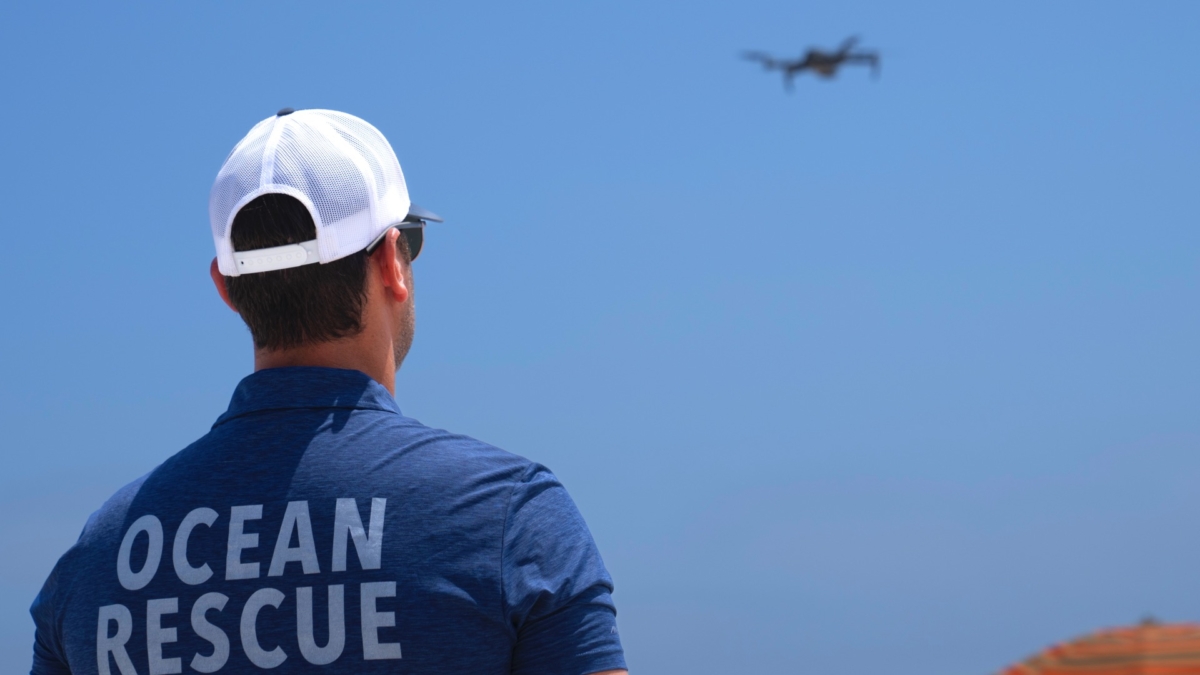In response to a slew of shark sightings and reported attacks across beaches in New York, authorities announced that dozens of new drones will be deployed to monitor the state’s coastlines to ensure beachgoers’ safety.
Gov. Kathy Hochul said in a press release on July 7 that the squadron of drones will be deployed to local beach communities on Long Island and New York City. The New York State Office of Parks, Recreation and Historic Preservation and the Department of Environmental Conservation (DEC) will also increase their surveillance over the waters in response to a rise in shark sightings over the 4th of July holiday.
“Ahead of the busy summer season, we developed new tools and strategies to monitor marine wildlife and protect the health and safety of New Yorkers,” Ms. Hochul said. “These new drones will increase the shark monitoring capacity of local governments across Long Island and New York City, ensuring local beaches are safe for all beachgoers.”
The move comes after five people, including two minors, reported being bitten this week in waters of some of New York’s most popular beaches, leading to heightened surveillance of the area’s coastlines.
The sighting of a 10-foot shark on Thursday prompted officials to keep people out of the water at Robert Moses State Park, the same Long Island beach that delayed its July 4 opening after a drone spotted a group of 50 sand sharks off the coast.
In its latest update, Ms. Hochul’s office said that swimming would be suspended when shark sightings and/or encounters with swimmers occur, noting that beachgoers must immediately clear the waters and that people will only be allowed to resume swimming at least one hour after the last shark sighting. Lifeguards, park police, and coastline staff will continuously patrol the waters for shark activities during this time.

“New York’s shores are home to a wild and natural marine ecosystem that supports the annual migration of sharks to our coastal waters. While human-shark interactions are rare, DEC encourages the public to follow shark safety guidance to help minimize the risk of negative interactions with sharks this summer,” New York DEC commissioner Basil Seggos said in a press release.
Just a few years ago, encounters with sharks were rare. But more recently, reports of sharks biting people have increased. Last year, eight people reported being bitten by sharks swimming in the shallows off Long Island’s beaches.
George Gorman, the state’s park director in Long Island, said the summer season has just begun, and the area already saw a spate of shark sightings and five people bitten.
“We are now more vigilant than ever,” Mr. Gorman said. “We have drones in the sky that watch over the waters. We have lifeguards on WaveRunners that watch over the waters.”
To minimize the risk of shark encounters, the DEC said swimmers should avoid areas with seals, schools of fish or diving seabirds, and murky waters. The agency also urges swimmers to avoid swimming at dusk, night, and dawn, stay close to the shore, and swim in groups. The full shark safety guidance can be found here.
Recent Shark Attacks
Prior to 2022, New York had only recorded a dozen unprovoked bites. Over the last decade, there were just four people bitten by sharks, according to data compiled by the International Shark Attack File, which tracks shark attacks around the world.
The first known encounter of the summer happened on Monday when a 15-year-old girl felt a bite on her leg while swimming. At a different beach soon after, another teen had to paddle back to shore after something began nibbling on his toes.
A day later, on the 4th of July, two men reported bites, possibly by sharks, in two separate encounters 60 miles apart. Although none of this week’s injuries were very serious, Gorman and others said they’re concerned by the rise in shark encounters.
About a dozen species of sharks swim off the coast of Long Island, none of them considered particularly ferocious, including the sand sharks that are more common in the area and grow to nearly 15 feet. Their sharp, jagged teeth might cause a fright, but the giant fish are usually docile and typically avoid human contact. A nursery for juvenile sharks is known to exist off Fire Island.
Sand sharks are unlikely to attack humans unless provoked, according to shark biologists. If they do interact with swimmers, it’s usually unintentional.
The Associated Press contributed to this report.
From NTD News








